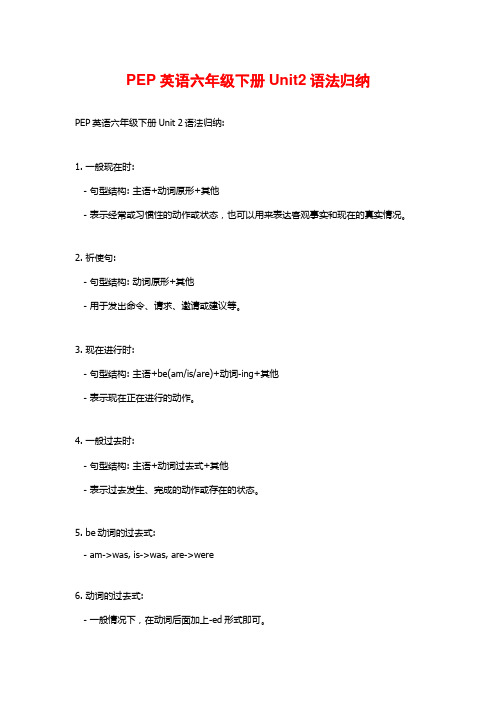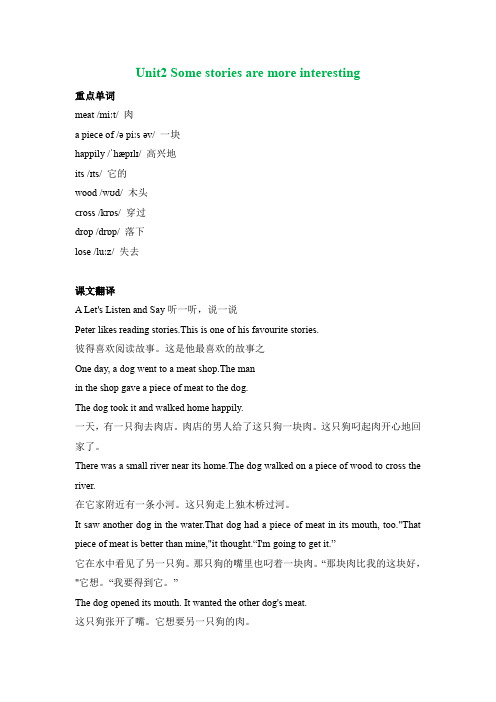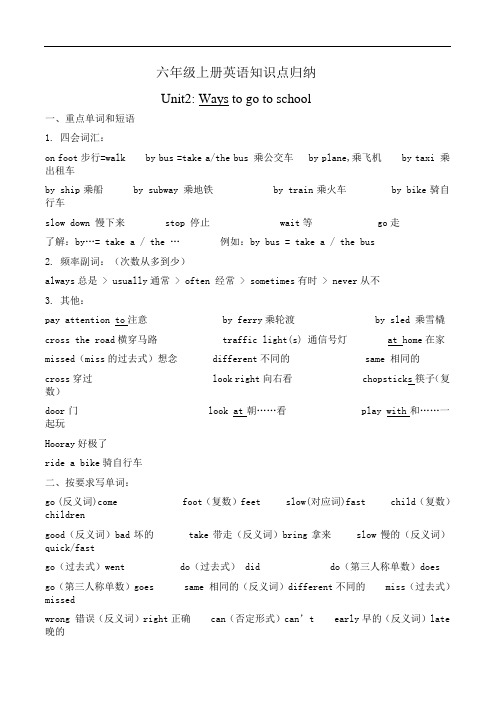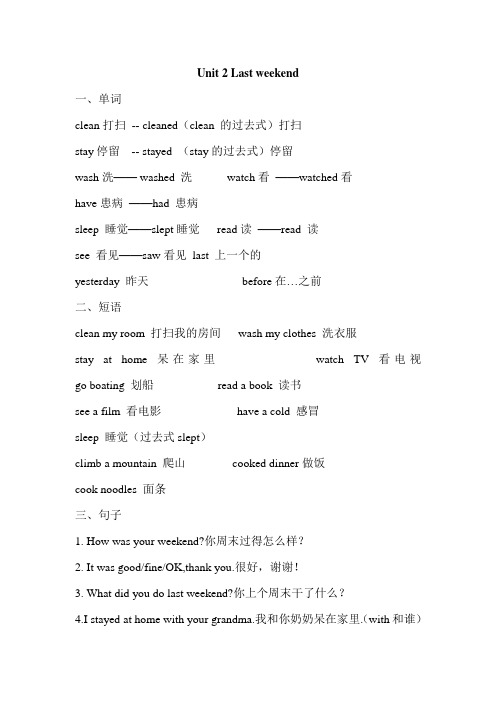六年级unit2
六年级英语上册素材-Unit2 We are in the east of the city课文翻译 湘鲁版

Unit2 We are in the east of the city第二单元我们在这个城市的东边Section AA部分1. Look, listen and act看、听并表演Andy is taking Harry around the city.安迪在带着哈里逛这个城市。
And Andy's friends help them.安迪的朋友们帮助他们。
Meet my cousin, Harry.来见见我的表哥哈里。
He is from England.他来自英国。
Hello, everyone.各位,你们好。
I'm taking Harry around our city.我在带着哈里逛我们的城市。
Good idea.好主意。
Look at this map.看看这张地图。
We are here.我们在这里。
We are in the east of the city.我们在这个城市的东边。
Let's go to the big bookshop.咱们去那个大书店吧。
It's in the north of the city.它在城市的北边。
Next to the bookshop is a big shopping centre.书店旁边是个大的购物中心。
There is a famous park and a small lake beside the shopping centre.购物中心旁边有一个著名的公园和一个小湖。
And there is a school between the park and the lake.在公园和湖之间有一个学校。
Then, we can go to the zoo.然后我们可以去动物园。
It's in the west.它在西边。
Finally, we can take a bus to the south.最后,我们可以坐公交车去南边。
新译林版英语六年级上册Unit2各板块重点短语语法

Unit 2 What a day! 短语单三、Grammar time1.★表述天气的形容词都由名词转换而来的,在用法上注意区分词性。
★表述天气用it 作主语,后接be动词,再加上表示天气的形容词。
It is/ was…It was yesterday, we saw some clouds in the sky.★rain 有两种词性:不可数名词“雨”这里雨量充足。
There is a lot of here.动词“下雨”看,外面正下着雨。
Look! It is outside.在南通,夏天经常下雨。
It often in summer in Nantong.昨天下了场雨。
It yesterday.明天会下雨。
It rain tomorrow.★rainy 形容词“多雨的”It is a day.2.日期的表达月份首字母大写一月January 二月February 三月March 四月April五月May 六月June 七月July 八月August九月September 十月October 十一月November 十二月December序数词的写法★ one → first two→second three→third★以ve 结尾的基数词改ve 为f 再加thfive→ twelve→★直接加h, eight→★去e 加th, nine→★从20 到90对的整十数字,将基数词后y去掉改为ie 再加thtwenty→ sixty→thirty→ seventy→forty→ eighty→fifty→ ninety→★从 20开始的第几十几的序数词,几十用基数词表示,几用序数词表示,别忘了连词符。
21→ twenty-first 22→ 45→★英语的日期表达9月20 日 the twentieth of September 20th September英语日期表达的格式: the + 几号(序数词) + of + 月份(首字母大写)英语日期数字表达格式:几号写在前面(序数词) + 月份(首字母大写)10 月 1 日4 月2 日3.不规则动词的过去式run→meet→see→have/has→get→make→speak→ do/does→tell→say→eat→find→go→lose→hold→wear→fly→★过去式和原形一样read→put→cut→let→★“i”改”a”give→sit→swim→drink→sing→begin→ring→★“i”改”o”write→drive→ride→★词尾“aw”/”ow”改”ew” ( show →showed)draw→grow→know→★“o”改”a”★去掉”e”加”t”keep→sleep→sweep→feel→★改”ought”★改”aught”★改”oo”四Fun time& Sound time & Song time1.pick cards 抽取卡片2.well done 做得好3. be nearly here 就在这里4. cheer together 一起欢呼5. go away 走开。
人教版六年级英语上册Unit2 ppt课件

How do you come to school?
人教版六年级英语上册Unit2
I come by ship .
人教版六年级英语上册Unit2
How do you come to school?
人教版六年级英语上册Unit2
I come by bike .
人教版六年级英语上册Unit2
How does he get there? He gets there ….
人教版六年级英语上册Unit2
How do you come to school?
人教版六年级英语上册Unit2
I come by taxi.
人教版六年级英语上册Unit2
How do you come to school?
人教版六年级英语上册Unit2
I come by bus .
人教版六年级英语上册Unit2
人教版六年级英语上册Unit2
let's learn PartB
人教版六年级英语上册Unit2
Traffic lights
人教版六年级英语上册Unit2
slow
人教版六年级英语上册Unit2
down
人教版六年级英语上册Unit2 Nhomakorabeatop人教版六年级英语上册Unit2
helmet
人教版六年级英语上册Unit2
早到的
从 到达/到 人教版六年级英语上册Unit2
How does he get to the UK from China?
三单形式
人教版六年级英语上册Unit2
选择正确的答案。
( B )1.Usually I go to school on foot .
PEP英语六年级下册Unit2语法归纳

PEP英语六年级下册Unit2语法归纳
PEP英语六年级下册Unit 2语法归纳:
1. 一般现在时:
- 句型结构: 主语+动词原形+其他
- 表示经常或习惯性的动作或状态,也可以用来表达客观事实和现在的真实情况。
2. 祈使句:
- 句型结构: 动词原形+其他
- 用于发出命令、请求、邀请或建议等。
3. 现在进行时:
- 句型结构: 主语+be(am/is/are)+动词-ing+其他
- 表示现在正在进行的动作。
4. 一般过去时:
- 句型结构: 主语+动词过去式+其他
- 表示过去发生、完成的动作或存在的状态。
5. be动词的过去式:
- am->was, is->was, are->were
6. 动词的过去式:
- 一般情况下,在动词后面加上-ed形式即可。
7. 带有情态动词的英语句子:
- 情态动词可以用来表示说话人对某种动作或状态的评价、推测、建议等。
8. 比较级和最高级:
- 比较级用于比较两者之间的程度或数量,最高级则表示三者或三者以上的程度或数量的最高。
9. 数词:
- 用来表示具体的数量。
10. 及物动词和不及物动词:
- 及物动词后面必须加上宾语来完成意思,而不及物动词在意思上已经完整。
这些是PEP英语六年级下册Unit 2的一些语法要点,希望对你有帮助!。
新人教(PEP)六年级英语上册Unit 2 Ways to go to school知识点详解

新人教(PEP)六年级英语上册Unit2 知识详解A Let’s talk 知识详解重难点1. 如何询问对方的出行方式—How do you come (to) ...?课文应用:How do you come to school? 你们怎么来学校的?句型结构:How do you come (to) + 地点?重点解析:how: 意为“怎样”,用来询问做事情的方式,位于句首,引导特殊疑问句。
do: 助动词,帮助构成疑问句,无实际意义。
come(to) + 地点:如果come后面所接的词为副词,则要省略介词to,如come here(来这儿)。
生活实例:大熊貓Tuantuan来到了北京,它是怎么来的呢?让我们来看一看吧!How do you come here? 你怎么来这儿的?By plane. 乘飞机。
知识拓展:怎样询问他人的出行方式How does he/she come (to) + 地点?例如:How does she come to the park? 她怎么来公园的?How do they come (to) + 地点?例如:How do they come to the bus station? 他们怎么来公共汽车站的?知识链接:含有how的特殊疑问句小结2. 频度副词大家庭课文应用:Usually, I come on foot. 通常,我走路来。
如果朋友问你“你多久出去旅游一次?”,你要怎么回答呢?答案可以有很多种:一个月一次、经常旅游有时旅游等。
这就需要用到频度副词,如always总是,usually通常,often经常,sometimes有时,never从不等。
语法小贴士:频度副词简介在本课中出现了副词家族中的一个很常见的成员——频度副词。
频度副词又称频率副词,用来表示事情发生的频率,即某事多长时间发生一次。
A Let’s talk知识详解拓展点1. Mrs的用法课文应用:Good morning, Mrs Smith! 早上好,史密斯老师!Mrs是对已婚妇女的称呼,意为“太太;夫人”,用于已婚女子的夫姓前。
六年级英语下册素材-Unit2 课文翻译 湘少版(三起)

Unit2 Some stories are more interesting重点单词meat /miːt/ 肉a piece of /ə piːs əv/ 一块happily /ˈhæpɪlɪ/ 高兴地its /ɪts/ 它的wood /wʊd/ 木头cross /krɒs/ 穿过drop /drɒp/ 落下lose /luːz/ 失去课文翻译A Let's Listen and Say听一听,说一说Peter likes reading stories.This is one of his favourite stories.彼得喜欢阅读故事。
这是他最喜欢的故事之One day, a dog went to a meat shop.The manin the shop gave a piece of meat to the dog.The dog took it and walked home happily.一天,有一只狗去肉店。
肉店的男人给了这只狗一块肉。
这只狗叼起肉开心地回家了。
There was a small river near its home.The dog walked on a piece of wood to cross the river.在它家附近有一条小河。
这只狗走上独木桥过河。
It saw another dog in the water.That dog had a piece of meat in its mouth, too."That piece of meat is better than mine,"it thought.“I'm going to get it.”它在水中看见了另一只狗。
那只狗的嘴里也叼着一块肉。
“那块肉比我的这块好,"它想。
“我要得到它。
”The dog opened its mouth. It wanted the other dog's meat.这只狗张开了嘴。
六年级上册Unit2知识点整理练习题

六年级上册英语知识点归纳Unit2: Ways to go to school一、重点单词和短语1. 四会词汇:on foot步行=walk by bus =take a/the bus 乘公交车 by plane,乘飞机 by taxi 乘出租车by ship乘船 by subway 乘地铁 by train乘火车 by bike骑自行车slow down 慢下来 stop 停止 wait等 go走了解:by…= take a / the …例如:by bus = take a / the bus2. 频率副词:(次数从多到少)always总是 > usually通常 > often 经常 > sometimes有时 > never从不3. 其他:pay attention to注意 by ferry乘轮渡 by sled 乘雪橇cross the road横穿马路 traffic light(s) 通信号灯 at home在家missed(miss的过去式)想念 different不同的 same 相同的cross穿过 look right向右看 chopsticks筷子(复数)door门 look at朝……看 play with和……一起玩Hooray好极了ride a bike骑自行车二、按要求写单词:go (反义词)come foot(复数)feet slow(对应词)fast child(复数)childrengood(反义词)bad坏的 take带走(反义词)bring拿来 slow慢的(反义词)quick/fastgo(过去式)went do(过去式) did do(第三人称单数)doesgo(第三人称单数)goes same 相同的(反义词)different不同的 miss(过去式)missedwrong 错误(反义词)right正确 can(否定形式)can’t early早的(反义词)late晚的三、重点句子(一)四会句子1. --- How do you come to school 你(们)怎么来学校的--- Usually, I come on foot. = Usually, I walk. 通常情况下,我步行来。
PEP人教版小学英语六年级下册Unit 2单元知识梳理总结

Unit 2 Last weekend一、单词clean打扫-- cleaned(clean 的过去式)打扫stay停留-- stayed (stay的过去式)停留wash洗—— washed 洗watch看——watched看have患病——had 患病sleep 睡觉——slept睡觉read读——read 读see 看见——saw看见last 上一个的yesterday 昨天before在…之前二、短语clean my room 打扫我的房间wash my clothes 洗衣服stay at home 呆在家里watch TV 看电视go boating 划船read a book 读书see a film 看电影have a cold 感冒sleep 睡觉(过去式slept)climb a mountain 爬山cooked dinner做饭cook noodles 面条三、句子1. How was your weekend?你周末过得怎么样?2. It was good/fine/OK,thank you.很好,谢谢!3. What did you do last weekend?你上个周末干了什么?4.I stayed at home with your grandma.我和你奶奶呆在家里.(with和谁)5. Did you do anything else?你还做了其他什么事吗?6. Yes,I cleaned my room and washed my clothes.是的,我扫了房间,还洗了衣服。
7.I want to buy the new film magazine.我想买期新的电影杂志。
8.Did you see a film?你看电影了吗?No,I didn’t .I had a cold. I stayed at home all weekend and slept.没有,我感冒了。
- 1、下载文档前请自行甄别文档内容的完整性,平台不提供额外的编辑、内容补充、找答案等附加服务。
- 2、"仅部分预览"的文档,不可在线预览部分如存在完整性等问题,可反馈申请退款(可完整预览的文档不适用该条件!)。
- 3、如文档侵犯您的权益,请联系客服反馈,我们会尽快为您处理(人工客服工作时间:9:00-18:30)。
六年级第二单元测试题
一、翻译下列短语或句子。
1. 步行____________________
2. 骑自行车_____________________
3. 上学_____________________
4.乘地铁___________________
5. 乘飞机---------------------------------
6. 乘火车----------------------------------
7. 你怎么来学校的?
__________________________________________________________
8. 通常我走路来。
__________________________________________________________
9. Sometimes I come by bus.
__________________________________________________________
二、选出每组中不同类的一项。
( ) 1 A. park B. school C. taxi
( ) 2. A. train B. car C. foot
( ) 3. A. stop B. go C. traffic
( ) 4. A. subway B. ship C. traffic
( ) 5. A. plane B. please C. subway
( ) 6. A. bus B. how C. ship
( ) 7. A. on B. by C. go
( ) 8. A. ship B. USA C. China
( ) 9. A. train B. school C. plane
( ) 10. A. go B. taxi C. come
三、选词填空,在横线上填上字母序号。
A. to
B. get
C. traffic
D. yellow
E. Stop
F. by
G. on
H. green
1. I go to school ___________ foot.
2. How can I __________ to the park?
3. Look at the ___________ lights.
4. My mother goes to work ___________ bus.
5. ____________ and wait at a red light.
6. Slow down and stop at a___________ light.
7. Come ___________ my home.
8. Go at a ___________ light.
四、单项选择。
( ) 1._____________do you come to school?
A. What
B. Where
C. How
( ) 2 I often come_____________bus.
A. on
B. in
C. by
( ) 3. I_____________go to the park by bike.
A. am
B. usually
C. was
()4 How can I ________the park?
A. go
B. get
C. get to
( ) 5 I go to school____ foot, because my home is ______.
A. by, fast
B. on , near
C. on, far
五、为问句选择相应的答句。
( ) 1. How do you go to school? A. My home is near the post office. ( ) 2. Where is your home? B .You can go by bus.
( ) 3. How can I get to the park? C. Yes, it is.
( ) 4. Is it fast? D. Sure, if you like.
( ) 5. Can I go on foot? E. I often go to school by bus.
六、翻译下列句子。
1. How do you go to school?
______________________________________________________________ 2. I go to school on foot.
______________________________________________________________ 3. Let’s go to the nature park by bus.
______________________________________________________________ 4. How can I get to the hospital?
______________________________________________________________ 5. I go by plane.
______________________________________________________________
6 Look at the traffic lights.
_____________________________________________________________ 7 . You can take the No.57 bus over there.
______________________________________________________________ 8. Stop and wait at a red light.
______________________________________________________________ 9 . Slow down and stop at a yellow light.
______________________________________________________________
七、找出错误,并纠正。
1. How do you come school? __________→___________
2. I go to home by bike. __________→___________
3. I usually come to school by foot. __________→___________
4. I go to the park on bus. __________→___________
5. Do you go on bike? __________→___________
八、按要求改写句子。
1. They usually go to school by ferry.(对划线部分提问)
_________ ________________ ________?
2. —How can I get to the library?(写出答句)
—You ______ ______ there _______subway.
3. You must stop at a red light.
__________ __________ a red light.
4. Amy’s home is near the library.(对画线部分提问)
__________ __________Amy’s home?
5 Mike often goes to school by subway. 对画线部分提问)
_________ ___________ ___________ ___________
九、阅读理解。
根据短文的意思,选择最合适的答案。
Jim is eleven years old. He comes from London. He usually goes to school by subway. His father is a teacher. He goes to work early and gets hack home late. He usually goes to work by car. Sometimes he goes by bike. In London he drives on the left side. Jim and his father go to the nature park
every weekend.
( )1. How does Jim go to school?
A. By taxi.
B. By subway.
( )2. In London, which side should Jim s father drive?
A. Left.
B. Right.
( )3. How does Jim’s father sometimes go t o work?
A. By car.
B. By bike.
( )4. Jim s father works in a____________.
A. hospital
B. school。
